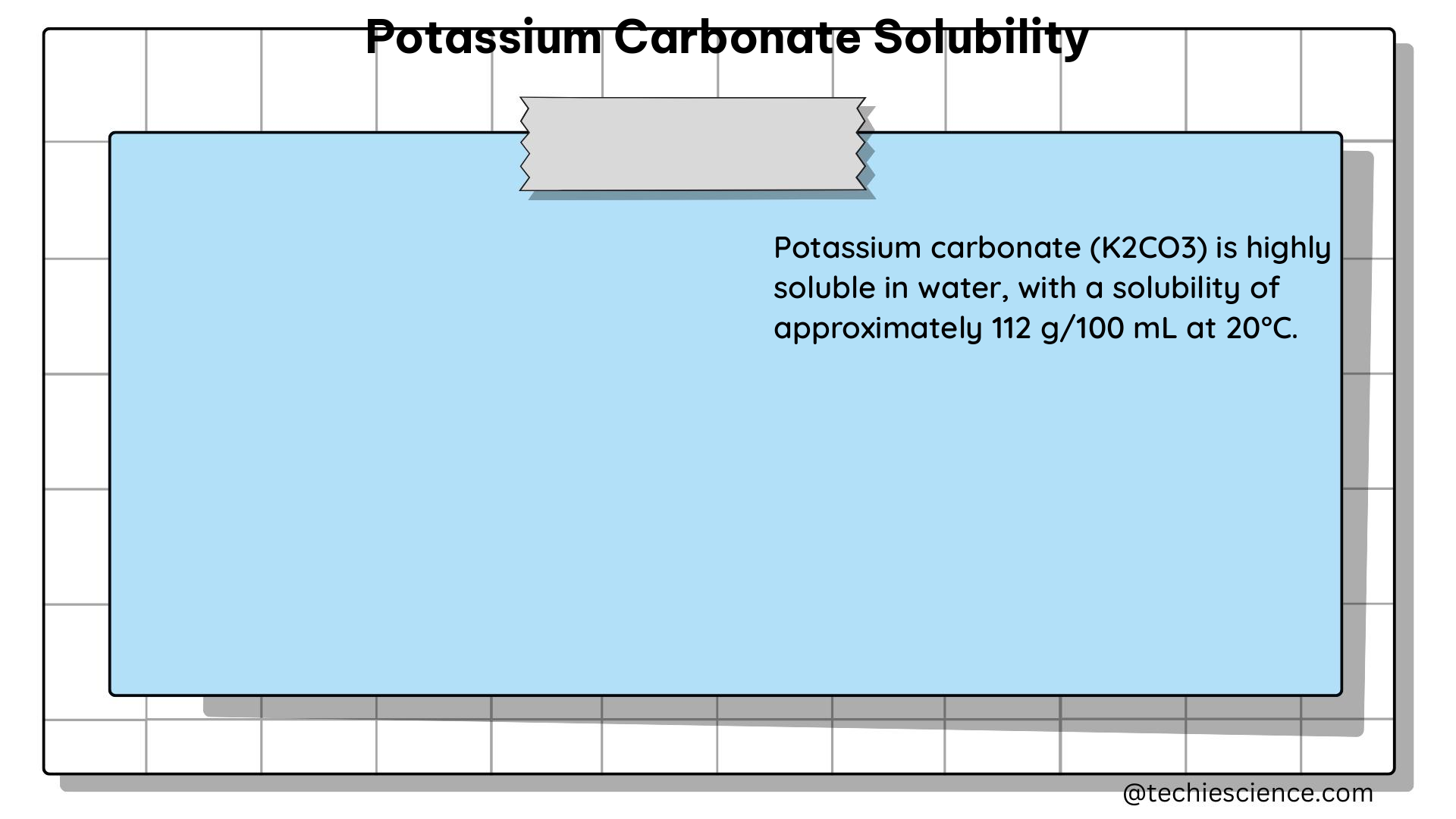Potassium carbonate, also known as potash, is a highly versatile chemical compound with a wide range of applications in various industries, from agriculture to pharmaceuticals. Its solubility in different solvents, particularly water, is a crucial factor in determining its behavior and utility. This comprehensive guide delves into the intricate details of potassium carbonate solubility, providing a wealth of technical information for science students and professionals.
Understanding Potassium Carbonate Solubility
Potassium carbonate is a white, crystalline solid that exhibits exceptional solubility in water. At 20°C, its solubility in water is approximately 1120 g/L, making it one of the most soluble inorganic salts. This high solubility is attributed to the strong ionic interactions between the potassium (K+) and carbonate (CO3^2-) ions in the aqueous medium.
Factors Affecting Solubility
The solubility of potassium carbonate is influenced by several factors, including temperature, pressure, and the presence of other substances. Understanding these factors is crucial for predicting and controlling the solubility behavior of potassium carbonate in various applications.
Temperature
The relationship between temperature and potassium carbonate solubility follows the general principle that increasing temperature typically enhances solubility. This is due to the endothermic nature of the dissolution process, where the entropy of the system increases as the solid dissolves in the solvent.
The solubility of potassium carbonate in water can be expressed by the following equation:
Solubility (g/L) = 1120.0 + 0.6(T - 20)
where T is the temperature in degrees Celsius (°C).
Pressure
Pressure also plays a role in the solubility of potassium carbonate, particularly in systems involving the absorption or desorption of carbon dioxide (CO2). Increasing the pressure can enhance the solubility of potassium carbonate by alleviating the surface stress of the solution, which can improve the dissolution of the solid.
The effect of pressure on potassium carbonate solubility can be described by the following equation:
Solubility (g/L) = 1120.0 + 0.0012(P - 1)
where P is the pressure in atmospheres (atm).
Presence of Other Substances
The solubility of potassium carbonate can also be influenced by the presence of other substances, such as acids, bases, and other salts. These interactions can lead to changes in the pH of the solution, which can affect the solubility of potassium carbonate.
For example, the solubility of potassium carbonate in water is affected by its pH, with a pKa of 10.33 at 20°C. At pH values below 10.33, the solubility of potassium carbonate decreases due to the formation of bicarbonate (HCO3-) and carbon dioxide (CO2), which are less soluble than the carbonate ion (CO3^2-).
Solubility in Other Solvents
While potassium carbonate is highly soluble in water, its solubility in other solvents can vary significantly. For instance, in dimethylformamide (DMF), potassium carbonate has a solubility of 7.5 g per 1000 mL at 25°C. However, it may not completely dissolve even at the boiling point of DMF.
The solubility of potassium carbonate in methanol has also been studied, and it has been found to be influenced by the presence of potassium hydrocarbonate (KHCO3) in the solution.
Practical Applications and Considerations

The high solubility of potassium carbonate in water makes it a valuable compound in various applications, such as:
-
CO2 Removal: Potassium carbonate solutions can be used for the removal of carbon dioxide (CO2) from gas streams, particularly in the context of carbon capture and storage (CCS) technologies.
-
pH Regulation: Potassium carbonate’s basic nature makes it useful for adjusting the pH of solutions, such as in the production of pharmaceuticals and cosmetics.
-
Fertilizer Production: Potassium carbonate is a source of potassium, an essential nutrient for plant growth, and is used in the production of various fertilizers.
-
Glass and Ceramic Manufacturing: Potassium carbonate is a key ingredient in the production of glass and ceramic materials, where its solubility and thermal properties play a crucial role.
However, it is essential to handle potassium carbonate with care due to its potential hazards. Ingestion, inhalation, or skin contact with potassium carbonate can cause severe injury or even death. Additionally, it can generate flammable and/or toxic gases when mixed with certain substances. Proper safety protocols and personal protective equipment (PPE) are necessary when working with potassium carbonate.
Conclusion
Potassium carbonate’s exceptional solubility in water, as well as its behavior in other solvents, makes it a versatile and widely used chemical compound. Understanding the factors that influence its solubility, such as temperature, pressure, and the presence of other substances, is crucial for effectively utilizing potassium carbonate in various applications. By mastering the technical details of potassium carbonate solubility, science students and professionals can better navigate the complexities of this important chemical and unlock its full potential in their respective fields.
References
- CO2 removal via promoted potassium carbonate with glycine, https://iopscience.iop.org/article/10.1088/1757-899X/702/1/012039
- Potassium carbonate | 584-08-7 – ChemicalBook, https://www.chemicalbook.com/ChemicalProductProperty_EN_CB4853879.htm
- Potassium Carbonate solubility in DMF – Sciencemadness.org, https://www.sciencemadness.org/whisper/viewthread.php?tid=159506
- Solubility of Potassium Carbonate and Potassium Hydrocarbonate in Methanol, https://www.researchgate.net/publication/231535294_Solubility_of_Potassium_Carbonate_and_Potassium_Hydrocarbonate_in_Methanol
- Experimental investigation of the effect of addition of different substances to potassium carbonate solutions on the vapor-liquid equilibrium of CO2, https://www.sciencedirect.com/science/article/abs/pii/S175058361530150X

The lambdageeks.com Core SME Team is a group of experienced subject matter experts from diverse scientific and technical fields including Physics, Chemistry, Technology,Electronics & Electrical Engineering, Automotive, Mechanical Engineering. Our team collaborates to create high-quality, well-researched articles on a wide range of science and technology topics for the lambdageeks.com website.
All Our Senior SME are having more than 7 Years of experience in the respective fields . They are either Working Industry Professionals or assocaited With different Universities. Refer Our Authors Page to get to know About our Core SMEs.